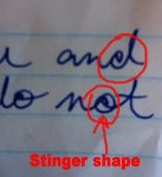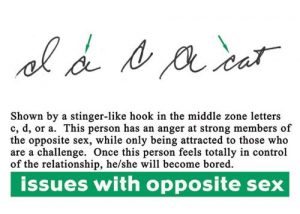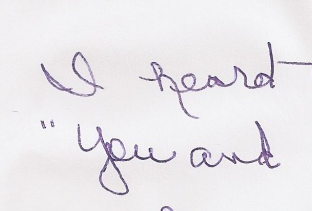 This single trait might be the cause of all your failed relationships. Seriously.
This single trait might be the cause of all your failed relationships. Seriously.
Article: A Bad Case of the Stingers.
Author: Bart Baggett, Founder, Handwriting University
The Stinger: A New Understanding of this Dysfunctional Issue.
In the 1980s, a hard-working and pioneering handwriting expert named Ray Walker introduced a single primary trait into the vocabulary of handwriting students worldwide. The stroke is commonly called “The Stinger.”
While this trait has been retaught as part of the Handwriting University curriculum with some accuracy, this article is going to expand upon this psychological trait and perhaps redefine its meaning entirely. 
As far as I have found, most other books and courses on handwriting analysis outside the influence of Ray Walker or Handwriting University simply don’t mention The Stinger — or they get it dead wrong.
Some so-called “experts” have called The Stinger a version of a “felon’s claw,” “a clue to manipulation,” or downright “poor ethics.” I am sure these definitions fall terribly short and have mislabeled hundreds of people with this complex as being much more nefarious than they are. They deserve both our sympathy and some caution.
Over the past 23 years of teaching this trait, the primary trait word choice used to describe this odd shape has been referred to in phrases as benign as “needs a challenge” or as judgmental as “issues with opposite gender.” Upon reflection, it is my opinion that these terms fail to grasp the real psychological meaning and personal history that motivate the writer.
It is often easy to coin a phrase that is either too simplistic or too judgmental.
When you are pioneering and expanding upon a field of psychology, I believe you have a responsibility to not only coin the right “word,” but also to dive deep into the meaning of that psychological condition so students who study this concept decades later can fully understand its implications.
The psychiatrists do this every few years with a new edition of the DSMV book. However, they rarely admit previous versions were wrong or myopic, and almost always have an expensive drug that they claim can treat such a disorder. Prior to 1980, there were no such words in our language for attention deficit disorder, gender identity disorder, or opposition defiant disorder. We have known since the mid 1930s that children with high buckle K’s and braced t-bars exhibit defiant personality traits. We have known that kids with sharp pointed m’s, no i-dots, and large writing don’t have as much concentration in school as other kids. This is not a disorder. This is a personality characteristic.
As professional handwriting analysts, we have a responsibility to revise and expand our known vocabulary and systems to better reflect the evolving state of this division of psychology. Unlike a psychiatric disorder, I don’t know of a pill that will cure this condition that I am about to explain.
This article will assist you in understanding the core psychological processes which are associated with the STINGER shaper. This mental “complex” will often result in behaviors such as manipulation, fights with the opposite gender, attracting the bad boy/ bad girl, or needing a challenge as it related to choices of romantic partners.
The core topic of this article is the stroke known as “The Stinger” in handwriting analysis, and its impact on the relationships and attraction strategies of its writer. While the issue will affect all relationships in that person’s life that give “validation” or “affection,” the context of romantic relationships is the most common place to find a pattern — and find a solution.
When you see a stinger in someone’s handwriting, the most obvious and accurate context to understand the trait would be in that person’s romantic relationships or his or her relationship with a parent of the opposite gender. The most disruptive symptom of this issue is her own personal process for feeling attraction for a certain type of man. Likewise, a man’s attraction for a certain type of woman. And the word “type” isn’t entirely accurate. It, more accurately, describes a certain behavior in a person, and often, we cluster behaviors into the word “type.” In any romantic relationship, there are moments of “validation” or “affection” given and received. The core issue of this trait is not enjoying or avoiding “validation”; it is the sequence and frequency of the validation. I will elaborate more on this concept later in this article.
Since my mentor Ray Walker taught me the concept of “The Stinger” in handwriting, my own ability to sort who was “good for me” and who was “bad for me” was forever increased ten-fold. This one trait alone has saved me from the pain of divorce and the typical emotional roller coaster most people experience when they “unwittingly” get involved with a person who has a “bad case of Stingers.” In 1993, I labeled this trait one of 10 “Hell Traits” which should be a red flag when deciding whether or not you want to get into a relationship. I still feel it is a red flag and should be considered with full knowledge of what my new insight is about to offer you.
If you’ve been a student or graduate of Handwriting University, you have been told that the “stinger-like hook” occurs most often in the oval portion of the letters d and c. However, this trait can also be seen in the letters a, o, and even g (in extreme cases). You could also describe this looking like an ocean wave about to crest. The Stinger is a visual reference to a bee stinger. When you get stung, it hurts. You can’t sting someone with a bowling ball. You must have a sharp point. Thus, the shape must have sharp angular form.
Let’s review what a Stinger looks like in handwriting. Then, we’ll dig into the psychological meaning.
There are people who have occasional Stingers in certain letters such as the oval of the d or the a.
Below is a sample of a woman with a very mild case of The Stingers. Stinger shapes do show up in a few a’s and d’s… but not in the many other places they could show up. So, if you were in the Handwriting University Mastery Program, you would know that every primary trait can be assigned a “weight.” This is another word for statistical significance.
A mild case of the stingers would carry a low weight (4 of 10). You might see them in the letter d or c, but not in the letter a or o.
This sample is about 6 of 10.
Below are a sample of stingers with a high weight. When they show up in the letter o, that is a high weight (8 of 10)
However, there are a few people who literally have a “Bad Case of The Stingers”… and this person’s entire relationship history and attraction strategy is dictated by this unconscious pattern (described in detail later) which is usually totally subconscious and out of their own control. The weight of this person’s stinger is much more intense (8 of 10). This weight indicates the characteristic is a significant driver in the person’s overall personality profile. It can’t be ignored and will show up at the surface — not just on special occasions.
Notice the Stinger shape in the lower case d and even a. This is a bad case of The Stingers.

As mentioned before, the phrases we have used to describe this trait, such as “needs a challenge” or “issues with the opposite gender,” were moving in the right direction, but incomplete. The term “challenge” gave some listeners the connotation of “risk-taker” or “adventure-seeker.” This simply is not the true meaning. The other phrase “issues with men or issues with women” often prompted the response of “But, I love my Dad [or Mom]” or “I don’t have a problem with men, I love men.” Both responses could have been completely true and were prompted by the use of poor terminology which focused too much on a typical symptom of the psychological trait and not the core psychological basis.
As with most personality traits, describing the resulting behavior is often only accurate to the listener if you can accurately calculate the context and even the culture of the person you are describing. The idea of the “Stinger stroke” has been defined mostly by the symptoms, and the core issue which drives these dysfunctional life choices was never properly defined (or understood) until now.
As an unrelated example, the label “delusional paranoia” would be an accurate “personality trait” which would lead us to a more descriptive phrase to describe typical symptoms of the condition.
A person with “paranoid delusions” often hears other people’s taunting and critical voices inside their head, or believes that their thoughts are being monitored by the government. The symptoms of a personality trait help us describe and define a trait.
The symptoms are NEVER the trait name. This is a critical mistake that beginning handwriting analysts make that professionals do not. In fact, professional handwriting analysts could easily discuss primary trait names with other professionals, but often translate these “industry terms” into language a layperson can understand. This is both prudent and assists the client in better grasping the complex nature of the personality being described. This article is for the professional and serious student of psychology and scientific handwriting analysis.
Again, to clarify, this article is not discussing delusional paranoia and this condition has nothing do with The Stinger. I only referenced this common label as an example so you can better understand why a proper definition is useful, but might be unwise to relay to your clients.
In the few cases where a person is totally unimpressed or not convinced that handwriting analysis is accurate after getting their own handwriting analyzed, the reason is almost always because the analyst chose an inaccurate “symptom” or “poor example” to describe a behavior commonly associated with a core personality trait. All graduates of Handwriting University can not only properly identify the core 100+ personality traits in any sample of handwriting, but most can weave them together in a coherent personality profile. Those that cannot identify the strokes or do basic trait stacking fail the final exam and never receive their certificate. This is why people who call themselves “handwriting analysts” but don’t hold a certificate are rarely as well-received as those that master this linguistic art of delivering the traits with accuracy and proper language.
Until handwriting analysts expand their vocabulary and understand the core basis of each trait, they will still occasionally give less-than-accurate analyses. This is a result of inexperience, not a flaw in the science.
Any person who has sat for their Certification Level Test from Handwriting University knows the importance our school stresses on understanding all the primary traits backwards and forwards and being able to combine those primary traits into a coherent personality profile. This is the reason why so many graduates of Handwriting University’s Certification program have built careers as full-time handwriting experts and other so-called “analysts” are relegated to party tricks or being hobbyists. It’s a science. Learn it with precision and you can change lives.
In addition, any good analyst must take into consideration the context. An 18-year-old Iranian girl would not resonate with the same explanation as a 67-year-old grandfather from the East Side of Los Angeles. The core handwriting trait can be the same, but the words you use to describe it might change based on context. This is why the idea of using metaphors to describe a person is more art than science. The idea of understanding primary traits and stacking them together is part of a scientific system. The system is scientific; the verbal articulation depends on skill… like an electrical engineer that is a good public speaker compared to an equally skilled electrical engineer who is a terrible and boring public speaker. (The visual of that analogy almost put me to sleep as I typed this. LOL!)
Okay, back to the Stinger and the revised definition which will enlighten you and give comfort and understanding to hundreds of people in your future path. Let’s delve into the psychological aspects as this condition.
A person (man or woman) who develops Stinger characteristics in their handwriting can often trace the origin back to an early need for validation from somebody who just wasn’t around, who was unavailable in some way, or, in some cases, was abusive. Abuse is the opposite of validation. So, that child or teen had to work really hard to get validated and to feel like they were getting love. Yes, it usually starts in childhood. However, it can start after the teen years — this is less common, but possible. You could replace the word “affection” with “validation.”
The usual situation arises from someone who would fit the archetype of a hero or a person of authority. Someone they felt like, “Wow, I can really depend on him.” Normally it arises from an early father figure, an older brother, an uncle, or a high-school lover.
When someone who is strong and trustable (a hero archetype) loves you and is present and clear in their love, there is no time separation between doing something that deserves validation and getting validation. A little girl scores an A on a test and the father gives proper validation, every time. That situation creates a healthy pattern that a person plays out throughout their lifetime. This is not the recipe for dysfunction in love later in life.
If you are a person with a bad case of The Stingers, dysfunction was created because there was emotional disappointment as a result of the person that you wanted validation from (your hero/dad). The dysfunction was not caused by a situation where he did not validate you at all. The “complex” has its seed in the fact that he did not give validation on a consistent, predictable basis.
Everybody universally craves validation and affection. Early in life, sometimes it is not as readily available or given. Perhaps the hero was traveling, busy at work, or spending time with a new wife. In those kinds of situations, there’s a constant challenge to get the validation you need. The time lag between doing something that warrants validation and affection become longer and longer and less predictable. This constant “anticipation” of validation and not getting in on a predictable pattern creates a dysfunctional pattern that plays out throughout the adult’s life. It is quite similar to the model of a psychological addiction.
The unconscious mind gets addicted to the hope and the loss in between wanting validation and getting it. It is normal to get addicted to the actual feeling of love. As brain scientists have proven over the past few decades, the love and sex stimulate chemicals as strong and controlling as many recreational drugs. The person with a stinger does not have enough validation or love to get comfortable with that feeling. Those feelings are like a jackpot when they occur. Unfortunately, they experience disappointment and hope much more often than they get validation. This is the place which is historically comfortable in their unconscious mind. This is the imprint which is the relationship between girl/hero, or boy/mom.
In psychological terms, the phrase “periodic reinforcement” creates the reward situation that most powerfully trains a specific behavior or way of thinking and responding to a given situation.
Dog trainers understand this. When training a dog, you will get the best outcome if you do not give a reward every single time a dog obeys a command. Perhaps you give praise but give a special treat irregularly. 100% predictability is the opposite of “periodic reinforcement.”
It is also believed that the periodic reinforcement offered by the very popular gambling machines called slot machines is part of what makes them so enticing. Players only win sometimes, so it keeps them in a state of anticipation and hope… and creates constant disappointment of not winning on most pulls of the handle.
People become addicted to gambling but not because of the payoff — it’s the emotion right before the payoff because they don’t know when there will be a payoff. Most people don’t realize that the exponential rise and popularity of the city of Las Vegas coincided with the invention and mass distribution of the slot machine. Slot machines provide “periodic reinforcement” very effectively.
Recently The Huffington Post shared an article about addiction to nicotine and cigarette smokers. The article referenced the “slot machine example” in the context of intermittent reinforcements. I think a deep understanding of the concept of “intermittent reinforcement” is critical to understanding what goes on inside the mind of a writer with Stingers.
“As the number of smoke-free environments increased, and because smokers smoke fewer cigarettes on average, today’s smokers generally wait longer between cigarettes. This delay increases the psychological and emotional reward value of each cigarette. At the same time, because they can’t smoke whenever they want, the timing is often uncertain, and the payoff — being able to light up — is irregular.
Paradoxically, this sort of ‘intermittent’ sporadic or random reinforcement is actually the strongest form of psychological reinforcement, thus making current patterns of smoking behavior harder to extinguish. Waiting to smoke is not quitting smoking!”
In love relationships, people with Stinger characteristics get into a sort of replay loop. Each time they enter a new relationship, they are, in a sense, pressing the reset button, hoping for a better outcome this time in a similar situation to the early hero situation in their lives.
They are pushing the reset button, and it’s not conscious. They might find themselves in a situation that plays out subconsciously like this:
In Scenario A, there’s a really nice guy — he’s a really nice, good-looking guy. He’s single. He seems to be responsible, and he always returns texts within minutes. You get that immediate validation — every time.
In Scenario B, there’s this other guy who is just as single but not as available. He is just as sexy and handsome, but he seems very busy. He might return your text message right away, or days later. You simply don’t know.
Scenario B involves a period of waiting. This period of waiting, and the emotions of uncertainty and hope, feel very familiar to people with Stingers. This situation creates another cycle of hope and anticipation, which the other man in Scenario A doesn’t stimulate. The hope and anticipation is what feels familiar, so the Stinger writer gravitates toward Scenario B because it feels correct — even though it is not the healthiest. It feels familiar and stimulates the mental drugs of anticipation, hope, and excitement… like a slot machine. The nice guy in Scenario A has failed to stimulate this area of the unconscious mind that a person with stingers craves so much at an unconscious level.
It can be a very perplexing and frustrating repeat loop for the person who is stuck in it. They may wonder how and why they get attracted to and pick certain people. They might also wonder why someone they were sooooo attracted to in the beginning lost all that attractiveness once that person was “tamed.”
So, a person with Stingers in their writing is addicted to the game of chasing people who are really hard to get. They unconsciously pick romantic partners who give unpredictable payoffs because it stimulates brain chemicals much like a slot machine stimulates brain chemicals.
It is because of this term that I have redefined a person with a stinger as having “Intermittent Validation Complex.”
Nobody wants to play a game that you win every time. Sports fans would never buy a ticket and cheer their team if the game were always fixed in a way that their team always won by a huge margin. It’s not really a fair game. If you watched a soccer or a football game and you knew the final score before the first whistle, it wouldn’t be as interesting, and ratings would fall.
The people with really bad Stingers truly are yearning for a state of a “game condition” which creates that feeling of uncertainty within the relationship. That’s very unhealthy as far as a long-term, stable relationships go. It can be very exciting when you’re dating and you don’t know if he’s going to call or when… So that sets up a real problem in finding a long-term, stable mate.
People with a bad case of Stingers are really emotionally attached to the game and not the outcome.
It is not uncommon to see a man and a woman who each have stingers attracted to each other and ending up in an extremely dysfunctional relationship full of unnecessary bickering, fighting, and turmoil — each having chosen the other to fulfill their addiction to the cycle of excitement, longing, disappointment, payoff, and mostly, hope.
You may be wondering why dating someone with stingers is such a bad thing. The answer can be related to the very useful theory of the six love languages. If you only can feel loved by receiving gifts, then you will probably show love by giving gifts. If you feel validation by getting compliments, you will give validation with compliments. Likewise, when someone is out of their comfort zone by getting too-consistent validation… they cause trouble so the validation is interrupted. People with a bad case of stingers unconsciously start trouble to stop the flow of consistent validation. That, my friend, is a recipe for a dysfunctional relationship.
But there is hope for people with Stingers, especially the milder cases where it only shows up in some letters but is not pervasive throughout the handwriting.
For people with “intermittent validation complex” who find themselves yearning for a game condition, they can transfer this pattern away from relationships and sexuality, and toward conditions like sports or video games.
You can still create that feeling of unexpectedness in your life or the thrill of not knowing what’s going to happen in a context not related to your relationships. Then you’ll feel somewhat satiated. Studies have shown that sports fans have similar brain chemicals to what the players actually have, just from observing a sporting event. (This is why I think my loving, conservative, 95-year-old grandmother really loves her daytime Soap TV shows. While she would never behave that way, her brain enjoys the fact that other people can engage in such salacious behavior — and she gets to watch.)
This kind of attraction to games is a pretty universal emotional experience. We all like games, in one form or another. If you don’t like sports, you probably like crossword puzzles. If you don’t like crossword puzzles, you probably like murder mysteries on cable crime networks. Mystery and surprises are all part of a sense of uncertainty which we find enjoyable. Wanting a game condition is a normal human experience. Wanting a certain balance between “uncertainty and certainty” is what self-help author Anthony Robbins identifies as two of the Six Human Needs.
It’s just that emotions and love are so emotionally anchored when you are a child that you think that’s the height of emotional satisfaction because those memories often get combined with hormones and sexuality (as you get older). So, you really think that a “love and validation game” will be the most satisfying game you could play. But it can be almost as fulfilling to your brain to watch a close game 7 of the NBA finals basketball — even if you are not a huge basketball fan. This is just one idea to get a person away from using their relationships to fulfill their desire for “periodic reinforcement,” and replace it with something more ecological.
As I have pointed out in many previous books and lectures (though it may seem simplistic), you CAN make progress simply by changing your handwriting, especially in a milder case of Stingers. One of my dear friends and graduate students did actually remove the Stinger shape from her handwriting with conscious intention. She definitely made progress in attracting men who were good for her. So, it is also possible to make lasting change using simple grapho-therapy.
Another way to heal the unresolved issues at the basis of Stinger is to go back into your past and revisit earlier decisions. If you don’t know a good Time Line Therapist or trusted hypno-therapist, you can do this through some self-meditation.
Ask yourself, “When I was a child, was there someone important to me who was both strong and challenging? Someone whose attention I craved but who was unavailable, so I couldn’t get it?” See if that resonates with you at all.
If so, the way that you can work on that is to do some memory journaling and find the source of your addiction to the feeling of “intermittent reinforcement.” Journal about those moments when you really wanted validation, wanting your hero to show up at your softball games, and he wasn’t there. Go back and just reanalyze those moments until you can see that he did love you, he just wasn’t that available. Even if you realize he didn’t love you, that can be reconciled too.
Reattach to the feeling of being loved and release the attachment to the emotions of yearning, realizing those moments do not capture the true story. You want to be attached to the moments of validation… not crave the moments of hope and tension.
People with Stingers should be told that there is nothing wrong with them that can’t be fixed. They simply have some psychological dents from growing up in a household where validation was not distributed on a consistent basis. But, when it’s about you, you think you’re full of deep issues because it’s your own life. It is often more difficult to get perspective on your own life than those that you counsel.
It can be like driving around in a Mercedes all day that’s got a small defect, like a broken blinker switch. You are incredibly annoyed and think the entire car is a piece of garbage. Then you realize some people are on bicycles because they can’t afford a car at all — much less a Mercedes! Contrast can be a powerful frame to put things into perspective.
Though I use a lot of psychological terminology and I address psychological issues, I want to be clear that I am not a licensed psychologist and have no desire to be one. For the average person, you will learn more relevant information from Handwriting University’s Transformational Handwriting Analysis approach than four years of undergraduate psychology. Our program includes a huge dose of knowledge from the field of neuro-linguistic programming (NLP).
The reason most handwriting analysts are mediocre is because they often don’t make these connections between the handwriting and the person’s past, beliefs, emotions and even brain chemicals. If you are not helping people transform people’s lives on a regular basis, it is because you have not studied the part of the puzzle we call the mind.
The handwriting is just a reflection of the unconscious mind, but if you don’t really know how the unconscious mind is formed, then you’re not going to be a world-class handwriting analyst and will never be a world-class counselor or transformational speaker. Because really, it’s not about handwriting at all — it’s about personality. That’s why most handwriting experts aren’t successful at creating lasting change in clients. They don’t really understand some of the key concepts the field of NLP has introduced: anchors and triggers and the unconscious mind.
Some good resources to help you understand this topic are the books by Richard Bandler and John Grinder on NLP and hypnosis. Even L. Ron Hubbard had a lot of good research and useful insights into the unconscious mind in some of his books dating back as far as 1955. In fact, I first heard the term “game condition” from an audio recording of L. Ron Hubbard recorded in the 1960s. There are so many great minds we can draw bits and pieces from to help us assemble a new 21st-century approach to understanding and transforming our lives.
Handwriting is great because it gives us real insight into what the unconscious mind is running, even though most people walking this planet are unaware of it.
I think people like my books and my teaching because I’m not just saying, “This handwriting trait equals this personality trait.” I’m digging deep into the psyche to explain how that comes to be for a more complete understanding.
You might be wondering what the new term we will be for the stroke called Stinger in the next revised Primary Trait Dictionary. Well, it might be a mouthful, but this term is more accurate. Someone with stingers is now a person with “Intermittent Validation Complex.” You might also hear me refer to it as “Romantic Game Condition.” I’m not sure either one of these will fit on the next printing of the Grapho-Deck, but maybe that’s for the best. This is one of those traits that only an advanced student could get their mind around anyway. If you have read this far in this article, you probably qualify as advanced.
Good job.
Now, go find a healthy game to play. We all like games where we don’t know the outcome in advance.
To learn more about this concept, attend one of our upcoming webinars and learn how to analyze handwriting for free.
http://myhandwriting.com/seminars/
Bart Baggett




















Permalink
Thank you Bart for writing this wonderful and fascinating article. I am a person with more than a mild stinger and this article has helped clarify why it shows up so much in my writing. I also think it will help heal some emotional scars received as a child.I have always felt a little self conscious when trying to explain the stinger in someone else’s handwriting knowing that I myself needed a more in depth explanation. I truly think this is one of your best articles and have learned so much from Handwriting University.
Permalink
Janis. You are welcome. This all came out of one “AH HA” moment when a client told me she had finally understood herself after 30 years of not being clear on this idea of validation and attraction. As soon as I used this metaphor to her …. I knew this would help other people gain some clarity on this very common issue. I appreciate your comments. Hope to meet you in person at the next conference!
Permalink
As someone with stingers in my “c”s, I’ve never felt comfortable with the definition until now. I had a father who was very strict, mercurial, and only home on weekends because of his work. So, I always felt maybe there was some type of emotional void, but this article…. NAILED IT!
Great job, Bart!
Permalink
thank you. it gave me real insight into my exes behaviour as I* looked back to something he once wrote me and yes he has the stinger.
Permalink
Permalink
Bart, thanks for the brilliant article. It helped me understand the infamous ‘stinger’ trait so well. It’s good to know it’s rechristened as ‘Intermittent Validation Complex’. I have stingers occasionally in my ‘a’ and ‘d’ but I don’t really have a resentment towards women with strong personalities. I don’t really resent them are take up a challenge with them. However, I realize I did not get timely affirmation and appreciation for accomplishments growing up. Hence I have occasional stingers. This article cleared it up.
Permalink
Dear Bart, This is an amazing illumination that has really cleared my doubt on the subject.
I am delighted in reading your articles as they’re usually educative.
Thanks a lot more times
Permalink
Thank you Bart, I think this was the best written and the most interesting article I have ever read in my life.